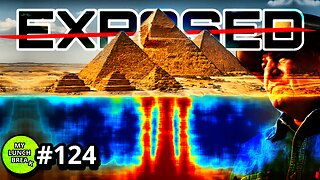Premium Only Content

The Book of Ezekiel
This summary of the book of Ezekiel provides information about the title, author(s), date of writing, chronology, theme, theology, outline, a brief overview, and the chapters of the Book of Ezekiel.
Background
Ezekiel lived during a time of international upheaval. The Assyrian empire that had once conquered the Syro-Palestinian area and destroyed the northern kingdom of Israel (which fell to the Assyrians in 722-721 b.c.) began to crumble under the blows of a resurgent Babylon. In 612 the great Assyrian city of Nineveh fell to a combined force of Babylonians and Medes. Three years later, Pharaoh Neco II of Egypt marched north to assist the Assyrians and to try to reassert Egypt's age-old influence over Canaan and Aram (Syria). At Megiddo, King Josiah of Judah, who may have been an ally of Babylon as King Hezekiah had been, attempted to intercept the Egyptian forces but was crushed, losing his life in the battle (see 2Ki 23:29-30; 2Ch 35:20-24).
Jehoahaz, a son of Josiah, ruled Judah for only three months, after which Neco installed Jehoiakim, another son of Josiah, as his royal vassal in Jerusalem (609 b.c.). In 605 the Babylonians overwhelmed the Egyptian army at Carchemish (see Jer 46:2), then pressed south as far as the Philistine plain. In the same year, Nebuchadnezzar was elevated to the Babylonian throne and Jehoiakim shifted allegiance to him. When a few years later the Egyptian and Babylonian forces met in a standoff battle, Jehoiakim rebelled against his new overlord.
Nebuchadnezzar soon responded by sending a force against Jerusalem, subduing it in 597 b.c. Jehoiakim's son Jehoiachin and about 10,000 Jews (see 2Ki 24:14), including Ezekiel, were exiled to Babylon, where they joined those who had been exiled in Jehoiakim's "third year" (see Da 1:1 and note). Nebuchadnezzar placed Jehoiachin's uncle, Zedekiah, on the throne in Jerusalem, but within five or six years he too rebelled. The Babylonians laid siege to Jerusalem in 588, and in July, 586, the walls were breached and the city plundered. On Aug. 14, 586, the city and temple were burned.
Under Nebuchadnezzar and his successors, Babylon dominated the international scene until it was crushed by Cyrus the Persian in 539 b.c. The reign of the house of David came to an end; the kingdom of Judah ceased to be an independent nation; Jerusalem and the Lord's temple lay in ruins.
Author
What is known of Ezekiel is derived solely from the book that bears his name. He was among the Jews exiled to Babylon by Nebuchadnezzar in 597 b.c., and there among the exiles he received his call to become a prophet (see 1:1-3). He was married (see 24:15-18), lived in a house of his own (see 3:24; 8:1) and along with his fellow exiles, though confined to Babylonia, had a relatively free existence there.
-
 27:24
27:24
MYLUNCHBREAK CHANNEL PAGE
17 hours agoPyramids of Giza Were Just Exposed
7.06K9 -
 19:51
19:51
Bearing
8 hours agoMy VAMPIRE WIFE is in a SATANIC MURDER CULT (Allegedly)🧛♂️🔪🩸
2K16 -
 15:07
15:07
Mrgunsngear
19 hours ago $1.11 earnedStreamlight TLR-1 HL-X USB Weapon Light Review 🔦
3.27K4 -
 1:27:41
1:27:41
The Quartering
3 hours agoThe RaceWars Of Fundraising, Ethan Klein Ends Hasan Pikers Career & More!
31.1K20 -
 1:12:18
1:12:18
Michael Franzese
21 hours agoLuigi Musical, Trump Attacks, and the Border Crisis: Unfiltered LIVE
44.4K21 -
 LIVE
LIVE
FreshandFit
23 hours agoSandwich Contest w/ Girls, Shiloh Drops N Bomb, Trump 1st 100 Days, Andrew v Prophet Debate on Christian Zionism & MORE Subathon!
14,118 watching -
 LIVE
LIVE
Major League Fishing
5 days agoLIVE! - Bass Pro Tour: Stage 4 - Day 3
169 watching -
 11:41
11:41
WhaddoYouMeme
22 hours ago $0.03 earnedThe Case for the Resurrection Keeps Getting Stronger
2371 -
 14:16
14:16
Sideserf Cake Studio
8 hours agoUsing SURPRISE INGREDIENTS to make two HYPERREALISTIC CAKES!
4191 -
 23:23
23:23
CatfishedOnline
9 hours agoRomance Scam Playbook: 101 Lies for Cash
209